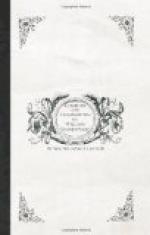“Master Ephraim! look at these badgers! with a long leg on one quarter and a short leg on the other. The wench herself might well and truly have said all that matter without the poet, bating the rhymes and metre. Among the girls in the country there are many such SHILLY-SHALLYS, who give themselves sore eyes and sharp eye-water; I would cure them rod in hand.”
Whereupon did William Shakspeare say, with great humility, —
“So would I, may it please your worship, an they would let me.”
“Incorrigible sluts! Out upon ’em! and thou art no better than they are,” quoth the knight.
Master Silas cried aloud, “No better, marry! they at the worst are but carted and whipped for the edification of the market-folks. {44a} Not a squire or parson in the country round but comes in his best to see a man hanged.”
“The edification then is higher by a deal,” said William, very composedly.
“Troth! is it,” replied Master Silas. “The most poisonous reptile has the richest jewel in his head; thou shalt share the richest gift bestowed upon royalty, and shalt cure the king’s evil.” {45a}
“It is more tractable, then, than the church’s,” quoth William; and, turning his face toward the chair, he made an obeisance to Sir Thomas, saying, —
“Sir! the more submissive my behaviour is, the more vehement and boisterous is Master Silas. My gentlest words serve only to carry him toward the contrary quarter, as the south wind bloweth a ship northward.”
“Youth,” said Sir Thomas, smiling most benignly, “I find, and well indeed might I have surmised, thy utter ignorance of winds, equinoxes, and tides. Consider now a little! With what propriety can a wind be called a south wind if it bloweth a vessel to the north? Would it be a south wind that blew it from this hall into Warwick market-place?”
“It would be a strong one,” said Master Silas unto me, pointing his remark, as witty men are wont, with the elbow-pan.
But Sir Thomas, who waited for an answer, and received none, continued, —
“Would a man be called a good man who tended and pushed on toward evil?”
William Shakspeare.
“I stand corrected. I could sail to Cathay or Tartary {46a} with half the nautical knowledge I have acquired in this glorious hall.
“The devil impelling a mortal to wrong courses, is thereby known to be the devil. He, on the contrary, who exciteth to good is no devil, but an angel of light, or under the guidance of one. The devil driveth unto his own home; so doth the south wind, so doth the north wind.
“Alas! alas! we possess not the mastery over our own weak minds when a higher spirit standeth nigh and draweth us within his influence.”
Sir Thomas.
“Those thy words are well enough,—very well, very good, wise, discreet, judicious beyond thy years. But then that sailing comes in an awkward, ugly way across me,—that Cathay, that Tartarus!




